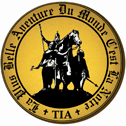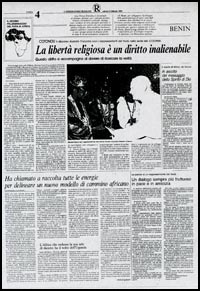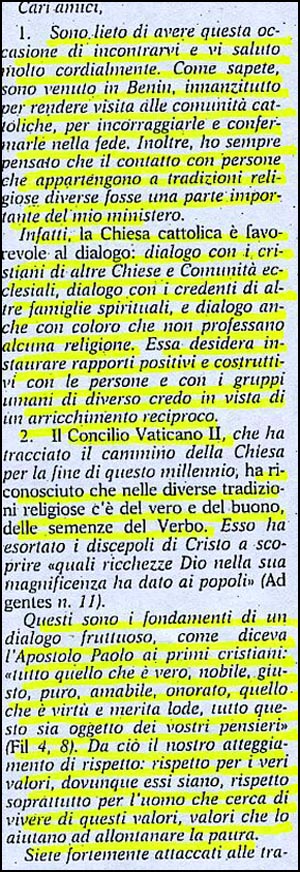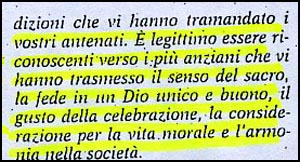The Satanic gods of voodoo and a pilgrim to their "sacred forest" of Ouidah in Benin, Africa
Benediktos the Satanic Apostate False Prophet approving of Voodoo at the prime present day center of all Voodoo in the world, Ouidah, Benin, Africa
There are six major ethnic groups in Ghana where Peter Turkson is from: Ashanti, Ewe, Guma, Guan, Mole-Dagbani and Ga-Adangbe.
Serpent worship is rife throughout the entire of West Africa and has its origin in the sorceries of Pharaoh who opposed the True God and the True God's servant Moses.
By David Willey
BBC News, Benin
Why should Pope Benedict want to travel nearly 10,000km (6,000 miles) on a weekend visit to Africa?
The basic reason is that his Catholic flock in Africa has increased faster there than in any other part of the world during the past 50 years.
The Pope has just been forced to set up a new programme of evangelisation in Europe, where Catholics have been leaving the church in ever greater numbers.
In Europe there is a serious problem of renewing an ageing priesthood.
In West Africa his flock is flourishing, despite antagonism and even violence between Christians and Muslims in several countries. New vocations are booming.
The Ouidah Catholic seminary is the burgeoning training ground for new African priests who - 150 years after the first Catholic missionaries from Switzerland established themselves there - are prepared to reverse the missionary direction and carry out pastoral work among Europeans in Europe.
Voodoo heartland
But Ouidah is also a centre for traditional African religions. It is the heartland of Voodoo, whose rituals and beliefs travelled to the Caribbean and to South America, particularly Brazil, during the centuries when slavery depopulated West Africa.
There is still a Voodoo temple filled with sacred pythons in Ouidah, not far from the huge Catholic seminary.
Voodoo is a belief system with a culture which includes art, dance, music, rituals, medicine, and is expressed in several languages.
Nearly half the population of Benin still follow traditional African animist religions such as Voodoo. Many who have converted to Catholicism still refuse to abandon their former beliefs entirely.
The Catholic Church however has a problem with this. It is called syncretism, which means treating all religions on the same footing.
Right-wing Catholic traditionalists denounced the late Pope John Paul II for allegedly "consorting with Satan" when he invited an African animist to take part in his groundbreaking interfaith prayer for world peace in the Italian city of Assisi, the shrine of Saint Francis, back in 1986.
Pope John Paul's successor, Benedict, invited another African traditional religious leader to celebrate with him the 25th anniversary of that meeting only last month. But this time there were no public prayers together, only private meditation.
The Catholic Church, which cannot tolerate the idea of Protestants and Catholics sharing the same communion table, has even greater difficulty in reconciling the worship of Jesus Christ side-by-side with African animists offering libations to spirits of the forest.
Large retinue
The Pope travelled to Cotonou, the economic capital of Benin, with a larger retinue of advisers than usual on his travels.
All the senior Vatican Cardinals who work in the Roman Curia were invited by the pope to join him for the six-hour flight.
They included Cardinal Peter Appiah Turkson from Ghana, the head of the Vatican's Council for Justice and Peace, the body which monitors human rights records not only in African countries but around the world.
Cardinal Turkson is the first Ghanaian to be appointed to the highest rank of prelates in the Catholic Church. He is even considered to be a possible candidate to succeed Benedict XVI, when the 84-year-old pontiff dies.
Another member of the Pope's retinue is Bishop Barthelemy Adoukonou, a former student of the Pope at the University of Regensburg in Germany, where he taught theology. Monsignor Adoukonou, promoted to the rank of Bishop as recently as last month, is rapidly gaining influence as an adviser in the highest ranks of the Roman Curia.
Sick children
One of Pope Benedict's restricted number of engagements in Benin - but one to which he to which he attaches great importance - is a meeting with 200 sick and disabled children, who are looked after by Catholic missionaries.
He will address all the suffering children of Africa in a speech he plans to make where they live.
Another high point of Pope Benedict's visit to Benin will be a meeting with the head of state, members of the government and members of the diplomatic corps in the presidential palace.
About 3,000 people are expected to attend and Pope Benedict plans another keynote speech, in which he will refer to the many human rights abuses in Africa.
He will refer also to the role of the Church during the democratisation of the country, following Marxist rule after its independence.
Here, he also plans to greet some local leaders of traditional African religions who have been invited for the occasion.
Vatican Radio has produced its first music CD on the occasion of the Pope's African visit.
Five thousand copies will be distributed to representatives of local churches. It is called Afrika Tenda Amani and has been recorded by two popular West African musicians Papa Wemba and Bonga.
At bottom of this article "Celebrating 50 Years of Vatican II, Sept. 28" just below :
10 a.m.: Why Celebrate 50 years of Vatican II; Challenges/Contributions of the African Church
2:30 p.m. Coffee Break
2:30 to 3:45 p.m. Marriage and Family
4 to 5 p.m. Panel Discussion
2 to 4 p.m. Presentation - Pappert Lecture Hall, Bayer Learning Center
5:30 p.m. Conference Mass - University Chapel, Administration Building
Is the world ready for a black Pope? Many would say it has been ready for so long that it is growing a little impatient. Cardinal Peter Turkson, of Ghana, is in no doubt. "Why not? We've had Kofi Annan as Secretary General of the United Nations... he had his problems, but he did it. Now we have Obama in the United States. So if, by divine providence, God would wish to have a black man as pope, I say thanks be to God!"
That was Turkson back in 2009, during a Vatican press conference. And now, after the resignation of Benedict XVI, he has no trouble seeing himself in the frame. Shows of diffidence and modesty are the standard reactions to questions of this sort (though, with hindsight, Benedict's disclaimers back in 2005 seem to have been only too sincere), but that is not the Ghanaian's style. "It would certainly mean a lot if I had to be pope," he mused this week. "If I was elected pope it would signal a lot of [personal] change, very big change in a lot of regards... It is going to be a life-changing experience, and I think that is what it has been for Benedict and those who have gone before us. The challenge will also be with the individual to want to make his mark, not trying to fit into anybody's shoes but finding his own shoes to wear."
Remarks like this may give an impression of arrogance, but Turkson has plenty of reason to consider himself a plausible candidate. Created a cardinal by Pope John Paul II in 2003, he was promoted by Benedict to one of the Roman Curia's top jobs, president of the pontifical council for justice and peace, in 2009, a sure sign of preference, and he has a finger in any number of other Vatican pies. Before that he was named relator, or general secretary, of the Church's second Synod for Africa.
However, a howler the Cardinal committed last year may have damaged his chances: at a meeting of senior Vatican figures last October, he showed a video on the subject of Muslim demographics, predicting that the far higher Muslim birthrate would soon lead to large parts of Europe, including France, being taken over by Islam. The video sparked an uproar which got worse when it emerged that it had been lifted from YouTube and was larded with dodgy statistics.
He did not take long to admit that he had made a mistake. "I understand that I chose the wrong video to stress the point of my concern," he said soon afterwards. And he claimed that his reason for showing the video was completely misunderstood. "For me to attack Islam would be to attack my own family," he maintained. "My paternal uncle was a Muslim and he took care of me when I was a boy, and when he grew old I took care of him until he died. The point was not to be anti-Islam. Absolutely not! The point was to highlight the demographic situation as a result of the anti-life tendency and culture in the Western world where, as I see it, there is a great need to apply the values of the kingdom of God to the social order." In fact, Turkson has urged Catholics to study the Koran, as an aid to better understanding.
Born in the village of Nsuta-Wassaw in western Ghana in 1948, he was christened Peter Kodwo Appiah Turkson and brought up speaking Fante, one of seven languages he went on to master. His roots were humble, his mother selling vegetables in the local market while his father – with symbolism as obvious as the boy's given name – was a carpenter.
His prospects were transformed by his schooling at St Teresa's Seminary in the village of Amisano, which describes itself as "the cradle and nerve centre of priestly formation in Ghana... forming future shepherds after the Lord's own heart". He went on to study Theology at a seminary in New York, where he moonlighted as a cleaner in a bank, leading to a ludicrous brush with the law. A friend of his in the city, Dr Joseph Marrota, an orthopaedic surgeon, recalled that a passer-by had spotted him roaming through the closed bank and called the cops. "It was 8 or 9 o'clock and they wanted to know what he was doing there," Marrota told the New York Daily News. "He told them the truth, that he was cleaning the bank. They were going to arrest him and he had to call the cleaning service. He almost got taken away."
Dr Marrota compared him to the last pope-but-one. "Like John Paul II, he's an outdoorsman, an athlete, a physically powerful man," he said. "He has that unbelievable combination of intellect, character and charisma." He said that Turkson requires only four hours of sleep a night and, unlike many other Princes of the Church, is thoroughly at home with his iPod and iPad.
After New York, he returned to St Teresa's Seminary with his Master's degree and taught there for a spell, following in the footsteps of the future Ghanaian president, Kwame Nkrumah. The effect of the place on the two men seems to have been similar: Nkrumah recalled in his autobiography: "As a teacher of these young novices, I, too, had to observe the strict rules of the seminary and my life at Amisano was quiet and lonely... but it was certainly during this period that I regained the religious fervour to such an extent that I formed the idea of taking the vocation to the priesthood myself." In 1975, Turkson was duly ordained, then pursued his studies further at the Pontifical Biblical Institute in Rome.
Since then, his ascent of the clerical ladder has been sure, and his promotion to cardinal by John Paul II was proof that Francis Arinze, the Nigerian cardinal who for many years was spoken of as being of papal material, now had a serious African rival. This week, Turkson suggested that Arinze, despite sharing top billing with him in one or two bookmakers' lists, was no longer in the running. "Before I got here [to Rome], there was a young African cardinal called Arinze from Nigeria," he told the Daily Telegraph, "and at every conclave everybody was talking about him as an emerging candidate. Arinze is now 80 and actually there is no way he can participate in the conclave..."
There are plenty of other papabile cardinals beside the Ghanaian, and Vatican watchers are all too familiar with the Roman proverb, "He who goes into the conclave a Pope comes out a cardinal." But supposing Turkson were to make the grade, what sort of a pope would he be?
Liberal Catholics hanker for a pontiff who would relax the Church's policy on issues such as gay marriage and abortion, but Turkson, like practically all the front-runners, is not going to be that man: the majority of the 118 voting cardinals were appointed by John Paul II and Benedict, both stalwart conservatives who had no wish to encourage more permissive attitudes. Like most African Catholics, Turkson is hostile to a liberal approach to these questions, describing Europe's falling birthrate as a product of its "anti-life culture". His ambition to, as he puts it, "apply the values of the kingdom of God and the gospel to the social order" places him directly in the line of the present Pope and his predecessor. Referring to the video that got him into trouble, he said that he showed it "to illustrate this reality in the Western world and to emphasise that if we do not evangelise the social order, it is capable of giving rise to all kinds of problems for society".
Within the rather narrow spectrum of views found in the Vatican, however, he is seen as a moderate. "A smart, hard-working and charming prelate... he's destined to be an ecclesiastical star even if he never takes over the Church's top job," Vatican watcher John Allen wrote in America's National Catholic Reporter in 2009. "Theologically, he's seen as a moderate: for example, Turkson has signalled openness to the argument that condoms might be appropriate for couples where one partner is HIV-positive and the other isn't, on the logic that the intent in that case is not to prevent pregnancy but to prevent disease."
Many outside the church would see that as a tragically myopic understanding of the argument for condom use in Africa. But it may be the best that the Catholic Church, in its present form, can come up with.
A Life In Brief
Born: Peter Kodwo Appiah Turkson, 11 October 1948, Nsuta-Wassaw, Ghana
Family: His mother sold vegetables at a market while his father worked as a carpenter. He is the fourth of ten children.
Education: Studied at St Teresa's Seminary in Amisano, Ghana, before attending St Anthony-on-Hudson Seminary in Rensselaer, New York where he graduated as a Master of Theology.
Career: He was ordained to the priesthood in 1975. After working as a professor and vice-rector at various seminaries, in 1987 he attended the Pontifical Biblical Institute in Rome and received a doctorate in Sacred Scripture. In 1992 he was appointed archbishop of Cape Coast in Ghana and in 2003 John Paul II made Turkson a Cardinal. He is the frontrunner to succeed Benedict XVI as the next Pope.
He says: "If God would wish to see a black man also as pope, thanks be to God."
They say: "He is a wonderful person, very down to earth and humble. He has that human touch." (The Rev Stephen Domelevo, the Ghana Catholic communication office)



















